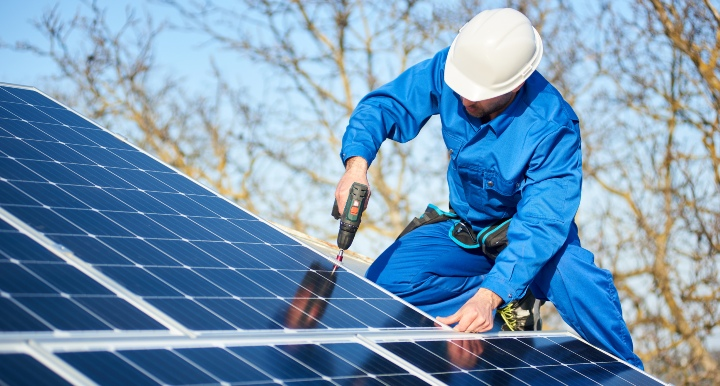Apr 3 2020
A new study performed by an international group of researchers shows that smaller scale low-carbon technologies that are more cost-effective and can be mass deployed could allow a quicker transition to net-zero emissions.
 Image Credit: University of East Anglia.
Image Credit: University of East Anglia.
New advancements such as solar panels and electric bikes have reduced investment risks, higher prospects for enhancement in terms of both performance and cost, as well as more possibilities for decreasing energy demand. All these are attributes crucial to expediting progress on decarbonization.
To fulfill the international climate targets, greenhouse gas emissions should be reduced by 50% within the next 10 years and net-zero realized around mid-century. Achieving this will necessitate rapid and unparalleled transformation in the supply, distribution, and utilization of energy.
Scientists at the Tyndall Centre for Climate Change Research of the University of East Anglia (UEA), the International Institute for Applied Systems Analysis (IIASA) in Austria, and the University Institute of Lisbon gathered information on an extensive range of energy technologies at various scales. They further tested how well the technologies performed against nine characteristics of expedited low-carbon transformation, like accessibility, cost, and innovation.
Furthermore, the researchers questioned whether is it better to prioritize expensive, non-divisible, large-scale, or “lumpy” technologies, like carbon capture and storage, whole-building retrofits, nuclear power, and high-speed transit systems. They also questioned whether is it better to concentrate on more “granular” options, which are less costly, smaller in size, and more modular so they scale not by becoming larger but by replicating.
Examples of these more granular technologies are electricity storage batteries, solar panels, smart thermostats, heat pumps, shared “taxi-buses” or taxis, and electric bikes.
In the results of the study published in the journal Science, the researchers report that subject to specific conditions, more granular alternatives out-class technologies of larger scale in several crucial ways.
A rapid proliferation of low-carbon innovations distributed throughout our energy system, cities, and homes can help drive faster and fairer progress towards climate targets.
Dr Charlie Wilson, Lead Researcher, University of East Anglia
Wilson continued, “We find that big new infrastructure costing billions is not the best way to accelerate decarbonisation. Governments, firms, investors, and citizens should instead prioritise smaller-scale solutions which deploy faster. This means directing funding, policies, incentives, and opportunities for experimentation away from the few big and towards the many small.”
Smaller scale technologies are not just quick to deploy but are also less complex and have a shorter lifetime, making it possible to bring enhancements and innovations to market more quickly. Besides, these technologies are more extensively accessible and enable creating more jobs, offering governments a strong basis for strengthening climate policies.
Large ‘silver bullet’ technologies like nuclear power or carbon and capture storage are politically seductive. But larger scale technologies and infrastructures absorb large shares of available public resources without delivering the rapid decarbonisation we need.
Arnulf Grubler, Study Co-Author and Professor, International Institute for Applied Systems Analysis
The scientists reiterate that smaller-scale technologies are not a comprehensive solution. In certain conditions, there can be no like-for-like alternatives to large-scale technologies and infrastructures like cement, steel, industrial plants producing iron, and aircraft flying long-haul.
Under other conditions, several smaller-scale technologies must be combined within the present infrastructure: widespread deployment of solar panels and heat pumps requires electricity networks, insulation products require buildings, and electric vehicles require charging stations.
Smaller scale innovations are not a panacea. but in many different contexts they outperform larger-scale alternatives as a means of accelerating low-carbon transformation to meet global climate targets.
Dr Nuno Bento, Study Co-Author, University Institute of Lisbon
Dr Charlie Wilson: Smaller scale solutions needed for rapid progress towards emissions targets
WATCH: Smaller scale solutions needed for rapid progress towards emissions targets. Video Credit: University of East Anglia.